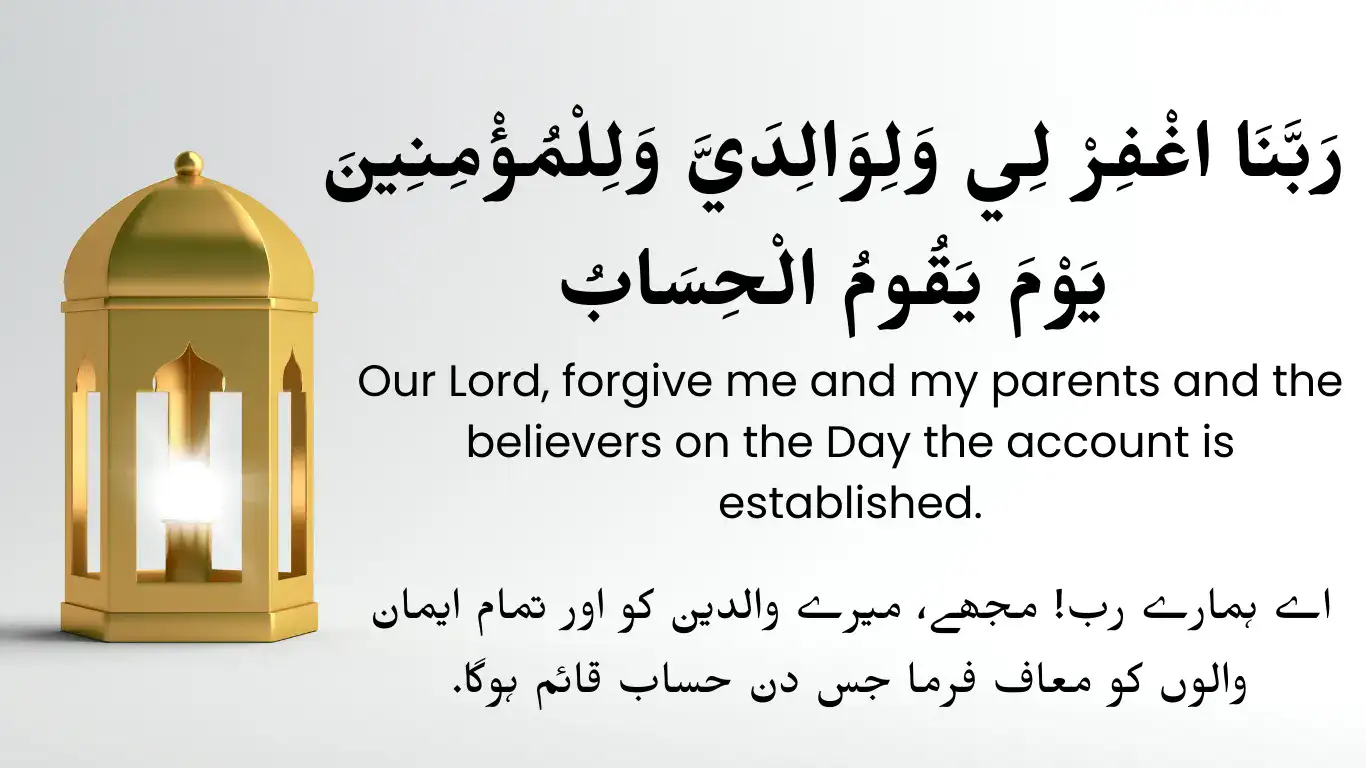The Allahummaghfirli Waliwalidayya dua is a heartfelt supplication that Muslims recite to ask Allah for forgiveness for themselves and their parents. Rooted in compassion, respect, and gratitude, this dua is a reminder of the values Islam places on family, self-reflection, and humility before Allah. In this article, we’ll delve into the meaning, significance, and benefits of reciting this dua, along with ways to incorporate it into daily life.
رَبَّنَا اغْفِرْ لِي وَلِوَالِدَيَّ وَلِلْمُؤْمِنِينَ يَوْمَ يَقُومُ الْحِسَابُ Dua
Arabic Text
- Arabic: رَبَّنَا اغْفِرْ لِي وَلِوَالِدَيَّ وَلِلْمُؤْمِنِينَ يَوْمَ يَقُومُ الْحِسَابُ
Transliteration
- Transliteration: Rabbana ighfir li waliwalidayya walil mu’mineena yawma yaqoomul hisaab
English Translation
- Meaning: “Our Lord, forgive me and my parents and the believers on the Day the account is established.”
Urdu Translation
- Urdu: “اے ہمارے رب! مجھے، میرے والدین کو اور تمام ایمان والوں کو معاف فرما جس دن حساب قائم ہوگا۔”
| Safar Ki Dua (Dua for Traveling) –Travel Prayer |
| Dua for Protection | dua for protection from evil eye |
| Char Qul –Source of Protection |
| Warafana laka zikrak tarjuma | وَرَفَعْنَا لَكَ ذِكْرَكَ |
Understanding the Meaning of Allahummaghfirli Waliwalidayya
The dua “Allahummaghfirli Waliwalidayya” is composed of three main parts, each carrying deep significance.
- Arabic: اللَّهُمَّ اغْفِرْ لِي وَلِوَالِدَيَّ
- Transliteration: Allahummaghfirli Waliwalidayya
- English Translation: “O Allah, forgive me and my parents.”
- Urdu Translation: “اے اللہ! مجھے اور میرے والدین کو معاف فرما۔”
This dua is a beautiful expression of seeking Allah’s mercy and forgiveness. It shows humility, as the supplicant begins by asking Allah to forgive themself, and then extends this mercy to their parents, reflecting love and respect.
Detailed Breakdown of Each Word in Allahummaghfirli Waliwalidayya
- Allahumma (اللَّهُمَّ)
- Meaning: “O Allah”
- This opening word calls upon Allah, invoking His presence with utmost humility and devotion. By beginning with “Allahumma,” we acknowledge Allah as the most merciful and compassionate, the One capable of granting forgiveness.
- Aghfirli (اغْفِرْ لِي)
- Meaning: “Forgive me”
- This part reflects self-awareness and accountability. By saying “Aghfirli,” the supplicant seeks personal forgiveness from Allah, admitting their own mistakes and imperfections.
- Waliwalidayya (وَلِوَالِدَيَّ)
- Meaning: “And my parents”
- The final part of the dua includes one’s parents in the request for forgiveness. This phrase emphasizes the high status and importance of parents in Islam. It showcases respect, compassion, and a desire for Allah’s mercy upon them, reflecting Islam’s teachings on honoring one’s family.
Significance of Allahummaghfirli Waliwalidayya Dua in Islam
The dua “Allahummaghfirli Waliwalidayya” holds great importance in Islamic teachings. Islam places a strong emphasis on maintaining family bonds, showing kindness to parents, and remembering them in prayers. Here are some of the key aspects of this dua:
- Expressing Gratitude: Including parents in one’s prayers is an expression of gratitude for their sacrifices and love. It acknowledges the bond between a child and their parents, highlighting the values of respect and kindness.
- Strengthening Faith: Reciting this dua strengthens one’s connection with Allah and reinforces faith. It reminds Muslims to seek forgiveness regularly, understanding that everyone is fallible and in need of Allah’s mercy.
- Showing Compassion and Humility: By asking for forgiveness for oneself and for others, the dua cultivates empathy and humility, both core values in Islam.
- Following the Sunnah: Praying for oneself and one’s parents aligns with the Sunnah (traditions) of Prophet Muhammad (PBUH), who encouraged believers to remember their families in their supplications.
Benefits of Reciting Allahummaghfirli Waliwalidayya
- Gaining Allah’s Forgiveness: This dua is a humble request for Allah’s mercy and forgiveness, benefiting both the individual and their parents.
- Strengthening Family Bonds: Regularly reciting this dua can reinforce family ties, as it reminds Muslims of the importance of honoring and praying for their parents.
- Spiritual Cleansing: Seeking forgiveness cleanses the heart and soul, helping believers maintain purity and strive toward righteousness.
- Preparation for the Hereafter: This dua is a reminder of the afterlife, encouraging Muslims to seek forgiveness and lead a life filled with good deeds, compassion, and faith.
How to Incorporate Allahummaghfirli Waliwalidayya into Daily Life
- After Each Prayer: Recite this dua after completing your daily prayers. This regular practice can become a source of inner peace and blessings for both you and your parents.
- During Special Occasions: Say this dua on special days, such as Fridays, during Ramadan, and other important Islamic events to seek extra blessings.
- Before Sleep: Make it a habit to recite this dua before sleep as a way to end the day with gratitude and supplication for forgiveness.
- Teaching the Next Generation: Teaching this dua to children fosters an appreciation for family, encouraging them to pray for their parents and loved ones.
Similar Duas for Parents and Family
Islam encourages praying for family and loved ones. Here are other supplications related to family that can be recited alongside Allahummaghfirli Waliwalidayya:
- رَبِّ ارْحَمْهُمَا كَمَا رَبَّيَانِي صَغِيرًا
- Rabbir Hamhuma Kama Rabbayani Saghira
- Meaning: “My Lord, have mercy upon them as they brought me up when I was small.” This dua asks for Allah’s mercy upon parents, acknowledging their care and sacrifices.
- رَبَّنَا اغْفِرْ لِي وَلِوَالِدَيَّ وَلِلْمُؤْمِنِينَ يَوْمَ يَقُومُ الْحِسَابُ
- Rabbana ighfir li waliwalidayya walil mu’mineena yawma yaqoomul hisaab
- Meaning: “Our Lord, forgive me, my parents, and the believers on the Day the account is established.” This supplication is a comprehensive prayer that includes oneself, parents, and all believers.
Conclusion
The “Allahummaghfirli Waliwalidayya” dua is more than just a prayer; it is an expression of humility, compassion, and respect. By regularly reciting this dua, Muslims not only seek Allah’s forgiveness for themselves and their parents but also embody the values of gratitude and familial love. Making this dua a daily practice strengthens one’s faith, reinforces family bonds, and serves as a reminder of the importance of forgiveness in Islam.
FAQs:
The dua “Allahummaghfirli Waliwalidayya” means “O Allah, forgive me and my parents.” It is a prayer asking Allah for forgiveness for oneself and one’s parents, reflecting respect and gratitude.
You can recite this dua any time, especially after daily prayers, before sleep, or during moments of reflection, such as Fridays or in Ramadan, to seek Allah’s blessings for yourself and your parents.
Praying for one’s parents shows gratitude, respect, and love. Islam highly values family bonds and encourages praying for the well-being and forgiveness of one’s parents, which is seen as a way to earn Allah’s blessings and mercy.





This is the right website for anybody who wishes to
find out about this topic. You realize a whole lot its almost hard to argue with you
(not that I really will need to…HaHa). You certainly put a brand new
spin on a topic that has been discussed for a long
time. Excellent stuff, just wonderful!